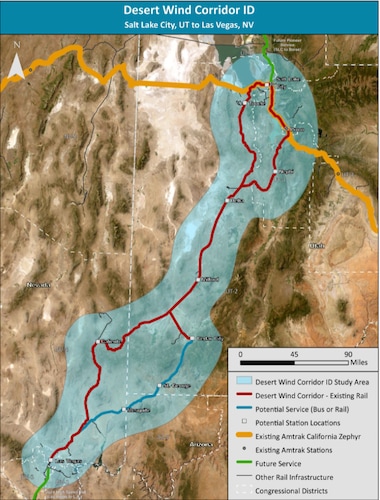Utah transportation officials unveiled plans to state lawmakers Wednesday that call for evaluating the idea of a Boise-Las Vegas rail service that could stop in Salt Lake City.
The Utah Department of Transportation applied for a $500,000 grant from the Corridor Identification and Development Program, which is a Federal Rail Administration initiative intended to create a pipeline of intercity passenger rail projects. The program was created after the 2021 passage of the federal Bipartisan Infrastructure Law, which invested in rail improvement.
Ben Huot, UDOT’s deputy director of planning and investment, told lawmakers in an interim transportation meeting Wednesday that the grant would fund the exploratory phase of the potential Las Vegas to Salt Lake City section of rail service, dubbed the “Desert Wind Corridor” project.
Under the current proposal, UDOT would partner with the Utah Transit Authority and the Nevada Department of Transportation to establish the rail service. The proposed route isn’t finalized yet, but the estimated travel time between Salt Lake City and Las Vegas would likely be between 7 and 9.5 hours each way, based on previous Amtrak service that was discontinued in 1997, according to a UDOT presentation.
The project also could include exploring a rail or bus service linking Cedar City, St. George and Las Vegas.

(Utah Department of Transportation) UDOT applied for a $500,000 grant that would fund an exploratory look at rail service between Salt Lake City and Las Vegas. Grant decisions are expected in September, a UDOT official said.
UDOT on Wednesday also presented the “Pioneer Corridor” project, which would connect Caldwell, Idaho, to Salt Lake City. Travel time is estimated at 7.5 hours each way, with additional stops — like Boise and Ogden — included along the proposed route.
(Utah Department of Transportation) The Idaho Transportation Department has also applied for a $500,000 grant to study potential rail service between Boise and Salt Lake City.
The Idaho Transportation Department has applied for a grant that would fund the exploratory phase of that project, along with the city of Boise, UTA and UDOT included as partners.
Decisions on the grant funding needed to explore these projects are expected in September, Huot said.
“This is the planning look at this — there’s not an obligation to continue further through project development and implementation,” Huot said during the committee meeting. “To have the project move forward, the state would be responsible to fund any kind of service that would be developed.”








